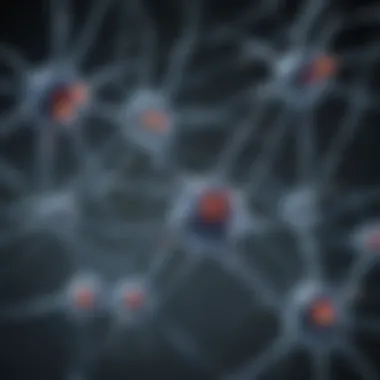Neurology and Genetics: A Complex Relationship


Intro
The intricate dance between neurology and genetics forms a foundation of understanding human brain function and associated disorders. Neurology, the study of the nervous system, delves into the mechanics of how our brains operate, while genetics pulls back the curtain on the hereditary factors at play in developing those functions. As researchers peel back the layers of the genome, they're discovering how genetic markers can illuminate both the pathways to neurological health as well as to conditions like Parkinson's disease, Alzheimer’s, and autism.
Understanding the connection between these two fields is not just an esoteric academic pursuit. In fact, it holds transformative potential for personalized medicine, where therapies can be tailored specifically to an individual's genetic makeup. Imagine a scenario where the treatment for a neurological disorder is as unique as the patient it is designed to help. With continuous advancements in both disciplines, the intersection of neurology and genetics brings forth new possibilities and ethical dilemmas alike.
In the following sections, we will explore what the latest research reveals, the methodologies that facilitate this exciting convergence, and the implications that arise from such an intricate relationship.
Prologue to Neurology and Genetics
The exploration of neurology and genetics is like peeling back the layers of an intricate onion—every layer reveals new insights into how our brains function and malfunction. This intersection is paramount, as it gives us a deeper comprehension of neurological disorders and cognitive functions, which are influenced by both biological and genetic factors. By highlighting the connections between these fields, one can start to appreciate the complexity of brain health, leading to better treatment and understanding.
Defining Neurology
Neurology is the branch of medicine that focuses on the nervous system, which encompasses the brain, spinal cord, and peripheral nerves. This field is vital for diagnosing and treating various disorders ranging from epilepsy to multiple sclerosis. Neurologists, the specialists within this discipline, utilize advanced techniques such as MRI scans and EEGs to observe and interpret the intricate workings of the nervous system and identify abnormalities.
Understanding Genetics
Genetics deals with heredity and variation in organisms. At its core, it studies how traits are passed down through generations. Genes—the building blocks of heredity—carry instructions for making proteins, which in turn play critical roles in the structure and function of the body's cells. The field has grown tremendously with advancements in technology, leading to better methods for studying genes and their influence on physical traits, behaviors, and, importantly, health outcomes.
The Overlap of Neurology and Genetics
The connection between neurology and genetics is unmistakable. Many neurological disorders have a genetic component, with variations in specific genes significantly affecting an individual's risk of developing these conditions. Research has shown that disorders such as Huntington's disease and Alzheimer’s can be linked to genetic mutations. In essence, the overlap of these domains forms a bridge: one side representing the biological processes of neuron function and health, and the other side focusing on hereditary factors that shape the individual's risk and resilience to neurological diseases. This intersection provides critical insights that are not only fascinating but also essential for the future of diagnosis and treatment.
"Understanding the genetic factors in neurology could unlock new pathways for personalized medical treatments, offering hope for improved patient outcomes."
By delving deeper into this intersection, we can unravel the profound complexities that underpin neurological disorders, leading to advancements in effective treatment protocols and ultimately improving the quality of life for those affected.
The Role of Genetics in Neurological Disorders
The intricate relationship between genetics and neurological disorders forms a crucial part of our understanding of various brain conditions. This section seeks to illuminate the significance genetics has in shaping neurological health and understanding illnesses that affect cognition, motor skills, and behavior. Delving into this subject not only offers insights into the biological underpinnings of such disorders but also opens doors to potential treatment strategies and preventative measures.
Genetic factors play a pivotal role in a multitude of neurological disorders, offering a deeper understanding of how inherent traits can influence an individual's susceptibility. Exploring these aspects, particularly how genetics interfaces with environmental factors, often sheds light on why some individuals might develop specific conditions while others do not.
Genetic Predisposition to Neurological Disorders
Genetic predisposition refers to the inherited likelihood of developing a specific disorder. In the realm of neurology, this concept is vital, as it helps researchers identify high-risk individuals based on their genetic make-up. For instance, certain variations or mutations in genes can significantly raise the odds of developing conditions like Alzheimer's or Parkinson's disease. By studying these genetic markers, scientists can begin to unravel the complex web of interactions that lead to these disorders.
This aspect of genetic predisposition not only aids in risk assessment but can guide targeted surveillance and personalized approaches to interventions.
Monogenic Disorders
Monogenic disorders arise from changes in a single gene. While rare, these disorders often provide a clear view of how specific genetic factors can lead to neurological issues.
Huntington's Disease
Huntington's disease (HD) is a classic example of a monogenic disorder, caused by a mutation in the HTT gene. HD is characterized by progressive motor dysfunction, cognitive decline, and psychiatric symptoms. The key characteristic of this disorder is its inheritance pattern, which is autosomal dominant. This means that inheriting just one copy of the mutated gene from an affected parent can lead to the manifestation of the disease.
One significant feature of HD is its age of onset, which typically occurs in mid-adulthood. This delayed onset allows carriers of the mutation to lead seemingly normal lives until the symptoms start to emerge, making it a compelling subject in the study of neurogenetics. However, this delay also complicates early intervention strategies, as individuals may not know they are carriers until the disease has already taken hold.


Neurofibromatosis
Neurofibromatosis (NF) encompasses a group of genetic disorders that cause tumors to grow on nerves. The most common types, NF1 and NF2, arise from mutations in the NF1 or NF2 genes, respectively. A key characteristic of NF is the diversity of its symptoms, which can range from skin changes to neurological complications, like learning disabilities or increased risk of tumors.
The unique aspect of Neurofibromatosis lies in its multifaceted nature. Its symptoms can vary widely among affected individuals, making it a fascinating yet challenging area of study. Additionally, because the symptoms may present differently, there is considerable variability in diagnosis and management. This variability highlights the importance of personalized approaches in treatment and underscores the significance of genetic research in understanding these disorders.
Multifactorial Disorders
Unlike monogenic disorders, multifactorial disorders arise from a complex interplay of multiple genes and environmental factors. They are more common and encompass many well-known neurological conditions.
Alzheimer's Disease
Alzheimer's disease (AD) is a multifactorial disorder marked by cognitive decline and memory loss. The exact cause remains unclear; however, it’s understood that both genetic and non-genetic factors contribute. The key characteristic of Alzheimer’s is the aggregation of amyloid plaques in the brain, which disrupts neuron function. Research shows that individuals with certain genetic variations, such as the APOE ε4 allele, face a higher risk of developing AD.
This aspect makes Alzheimer’s a significant study subject in neurogenetic research because understanding its genetic components may lead to targeted therapies. Yet, it also poses challenges – for instance, individuals with the risk alleles may live in constant uncertainty about their cognitive future.
Parkinson's Disease
Parkinson's disease (PD) is characterized by motor symptoms such as tremors, rigidity, and bradykinesia. Similar to AD, PD also has a genetic link, yet it is influenced by various risk factors. The multifactorial nature of PD allows for a wider variety of genetic predispositions and environmental interactions. A key characteristic of Parkinson's is the degeneration of dopaminergic neurons in the brain, which leads to its hallmark motor impairments.
The genetic factors associated with PD include mutations in genes like SNCA and LRRK2. Understanding these genetic components furthers our knowledge of the disease and opens up new avenues for therapeutic interventions. However, the unpredictability of the onset and progression of PD adds a layer of complexity, highlighting the importance of research into both its genetic and environmental influences.
"Genetics is not the only piece of the puzzle; understanding the intricate interplay between genetics and environmental factors is key to unlocking new treatment avenues for neurological disorders."
In summary, the role of genetics in neurological disorders is vast and multi-dimensional, encompassing various types of disorders, from monogenic to multifactorial. Whether through the lens of genetic predisposition or specific genetic mutations, it is clear that integrating genetics into our understanding of neurology is essential for advancing research and improving clinical outcomes.
Advancements in Neurogenetics Research
The field of neurogenetics has made significant strides in recent years, providing fresh insights into how our genetic make-up interfaces with neurological function. This section illuminates pivotal advancements and considers their far-reaching implications.
Research in neurogenetics is crucial, as it not only helps unravel the complexities of neurological disorders but also paves the way for innovative treatments. By tying together genetic information and brain function, these advancements enhance our understanding of various conditions like Alzheimer's and Parkinson’s disease, opening doors to potential interventions. The push towards precision medicine—where treatment is tailored to individuals based on their genetic characteristics—is particularly promising. This is not just a development in science but also a leap towards personalized care in neurology.
Genome-Wide Association Studies (GWAS)
Genome-Wide Association Studies, commonly referred to as GWAS, have become a cornerstone in neurogenetic research. These studies involve scanning complete sets of DNA, or genomes, from many individuals to find genetic variations linked to specific conditions. The advent of high-throughput genotyping technologies has enabled researchers to analyze hundreds of thousands of single nucleotide polymorphisms (SNPs) at once.
GWAS have unveiled numerous genetic markers related to neurological disorders, such as:
- Alzheimer’s Disease: Recent GWAS identified variants near the APOE gene that significantly increase risk for Alzheimer’s.
- Schizophrenia: Findings have linked multiple genetic variants to an increased predisposition to this complex condition.
"GWAS has revolutionized our approach to studying complex traits, giving us a clearer map of genetic risk factors associated with neurological diseases."
Despite their achievements, GWAS are not without limitations. Most notably, they often fall short in explaining the exact mechanisms through which these genetic variants influence disease, necessitating further exploration.
Next-Generation Sequencing Technologies
Next-generation sequencing (NGS) technologies have transformed the field of genetics, allowing researchers to decode genomes rapidly and affordably. This has propelled neurogenetics forward dramatically, enabling a more comprehensive understanding of the genetic basis of neurological conditions.
The advantages of NGS are profound:


- Speed and Efficiency: Researchers can sequence entire genomes in a fraction of the time it used to take.
- Depth of Information: NGS can identify a wide range of genetic changes, including rare variants that might be overlooked in other methods.
Applications of NGS are varied—be it in identifying mutations in conditions like Fragile X Syndrome or uncovering novel mutations in neurofibromatosis. With NGS, the dream of pinpointing personalized treatments tailored to specific genetic profiles is getting closer to reality. The ongoing integration of these technologies with clinical practices holds significant potential for enhancing diagnostic precision in neurology.
Functional Genomics in Neurology
Functional genomics seeks to understand the relationship between genes and their functions, particularly how genetic code translates into biological activity. In neurology, this approach is especially valuable, as it provides insights into how genetic variants can affect neuronal pathways and contribute to disease pathology.
The benefits of applying functional genomics to neurology include:
- Identifying Pathways: By understanding which pathways are affected by genetic changes, researchers can better comprehend the underlying mechanisms of disorders.
- Target Identification: Functional genomics can suggest potential targets for new therapies, assisting in drug design that focuses on specific pathways implicated in neurological conditions.
- Drug Repurposing: Existing medications can be examined for new uses based on newly discovered genetic knowledge, potentially speeding up the treatment development process.
The road ahead for functional genomics in neurology is promising, albeit with challenges. High-throughput techniques and systems biology approaches are being refined to yield clearer insights into how genes work together to impact brain health and disease. The synergy of functional genomics with GWAS and NGS paints a richer picture of neurogenetics and lays groundwork for transformative treatment strategies.
Implications of Neurological Genetics for Treatment
The intersection of genetics and neurology has birthed a revolution in how we understand and treat neurological conditions. As we dig deeper into this field, we uncover nuances that are not just scientific details but also pave the way for new treatment paradigms. Essentially, the focus on neurogenetics isn't merely an academic exercise—it has real implications for those suffering from neurological disorders.
Personalized Medicine in Neurology
Personalized medicine is at the forefront of medical advancements today, especially in neurology. The traditional one-size-fits-all approach to treatment can fall flat—after all, each human is unique. Personalized medicine tailors treatment based on individual genetic profiles, leveraging insights derived from our DNA to optimize therapeutic outcomes.
Imagine providing a patient with a medication that’s been specifically designed for their genetic make-up. Not only does this promise improved efficacy, but it can also lead to reduced side effects. For instance, a drug that works wonders for one patient may not yield the same results for another, largely due to genetic differences.
"Precision medicine represents a shift from treating the average patient to treating the individual in front of us."
The implications are vast. Conditions such as epilepsy or multiple sclerosis are getting a personalized touch, enhancing the quality of life for those affected.
Gene Therapy Prospects
Gene therapy is perhaps one of the most intriguing possibilities in the realm of neurogenetics. This strategy aims to directly correct faulty genes or introduce new genes to combat specific conditions. By targeting the root cause of a disorder, gene therapy promises to not just alleviate symptoms but potentially cure them.
Consider, for example, treatments currently being explored for conditions like spinal muscular atrophy. Gene therapy delivered directly to the nervous system offers hope that these patients may experience a substantial improvement in motor functions. While this field is still nascent, the potential extends beyond specific disorders. Researchers are investigating various neurological conditions, ranging from Alzheimer’s disease to inherited neuropathies, suggesting that gene therapy could become a cornerstone of treatment.
Pharmacogenomics: Tailoring Treatment
When talking about neurogenetics, one cannot overlook pharmacogenomics—the study of how genes affect a person’s response to drugs. This layer of personalized medicine is vital in ensuring that the medications prescribed are effective for the individual patient.
For instance, certain genetic variants can determine how a person metabolizes antipsychotics or antidepressants, influencing efficacy and safety profiles. By assessing a patient’s genetic makeup, clinicians can better predict which medications will work best and at what doses. This leads to quicker and more effective treatment adjustments, minimizing the trial-and-error approach commonly associated with psychiatric and neurological medications.
Ethical Considerations in Neurogenetic Research
The field of neurogenetics sits at the confluence of neuroscience and genetics, making its ethical considerations particularly complex. As we pursue greater understanding of the brain's genetic underpinnings, we must remain vigilant about the implications such research carries. From gathering informed consent to grappling with potential vulnerabilities surrounding genetic data, each step warrants careful thought. Ethical frameworks ensure that participants in research are treated fairly and that their rights and privacy are safeguarded.
Informed Consent in Genetic Studies
Informed consent is more than just a formality; it serves as the backbone of ethical research practices. When it comes to genetic studies, the stakes are high, as participants are often sharing sensitive information about their genetic makeup. This requires researchers to communicate clearly and openly about the potential risks and benefits involved. The language used must be straightforward, avoiding jargon that can bewilder non-experts.
- What participants need to understand includes:


- The scope of the study and its purpose
- Possible risks of sharing genetic information
- The use and potential sharing of data
Researchers must reassure participants regarding their data's confidentiality. They should also explain how consent can be withdrawn at any time without repercussions, cultivating an atmosphere of trust. This means taking extra steps to ensure that participants truly grasp what they are engaging in, mainly because genetic findings can have far-reaching implications for not just individuals, but families too.
Implications of Genetic Testing
Genetic testing in neurological research can lead to valuable insights, but it poses significant ethical dilemmas as well. While identifying genetic predispositions can inform treatment options, it might also usher in unexpected consequences. For instance, when someone finds out they carry a gene linked to a neurological disorder, it could provoke anxiety or affect their family dynamics. Participants might worry about how their results could alter their relationships, employment, or even insurance coverage.
Furthermore, genetic testing might not just impact the individual but ripple through their family. If a mother is found to be a carrier of a genetic disorder, her children might then face the same dilemma. This interconnectedness of genetic risk brings about the need for ethical obligations to discuss not just personal implications, but also familial aspects.
Addressing Discrimination and Privacy Issues
One can’t overlook the potential for discrimination arising from genetic research. The fear that people could be unfairly judged or treated based on their genetic information is real. This fear extends to areas such as employment and healthcare. Genetic data could unwittingly become the basis for exclusion from jobs or insurance policies, leading to stigmatization. Thus, researchers must engage with legislators and ethicists to develop robust protections against such discrimination.
- Some effective strategies may include:
- Implementing strict guidelines on data usage
- Developing public awareness campaigns about genetic privacy
- Advocating for strong laws such as the Genetic Information Nondiscrimination Act (GINA)
Ultimately, it’s vital for neurogenetic researchers to balance the quest for knowledge with a commitment to ethical stewardship. This balance helps maintain public trust and encourages participation in vital studies. This focus on ethics presents the best path forward as we navigate this intricate landscape that merges the complexities of the brain with the subtleties of genetic influence.
“Ethics is knowing the difference between what you have a right to do and what is right to do.” - Potter Stewart
Future Directions in Neurogenetic Research
As we venture further into the world where neurology intersects with genetics, the topic of future directions in neurogenetic research becomes increasingly significant. This field holds promises of discovery, especially as the understanding of complex neurological disorders evolves. Several specific elements warrant attention, including the emerging technologies, the necessity for longitudinal studies, and the value of integrative approaches.
Emerging Technologies in Genetics
The pace of technological advancement is staggering. With the advent of tools like CRISPR-Cas9, researchers can modify genes with unprecedented precision. This could revolutionize how we approach neurological diseases. Beyond CRISPR, techniques such as single-cell sequencing and epigenomics are gaining ground. These methods allow scientists to delve deep into the genetic blueprints of individual neurons, opening pathways to understand how variations at a genomic level impact brain function and dysfunction. Moreover, machine learning algorithms are increasingly used to analyze vast datasets, uncovering patterns previously invisible to human researchers.
"The fusion of technology with genetics is providing insights that were simply unfathomable a few decades ago."
Longitudinal Studies on Genetic Influences
Studying genetics isn't a sprint; it's a marathon. Longitudinal studies provide a framework for observing how genetic predispositions manifest over time. By following the same individuals, researchers can see how environmental factors interact with genetic markers. This becomes especially pivotal when examining age-related neurodegenerative diseases, like Alzheimer’s or Parkinson’s. Long-term data helps identify early biomarkers that might signal the onset of these conditions. Furthermore, establishing connections between genetic variants and their long-term effects allows for more robust predictions regarding disease risk.
Integrative Approaches: Neuroscience and Genetics
Harnessing the potential of both neuroscience and genetics involves a multidisciplinary strategy. This integration means not only looking at how genetic factors influence neurological conditions, but also considering how neurological mechanisms can guide genetic research. For instance, understanding neural networks in the brain can shed light on why certain genetic mutations lead to specific disorder pathways. As collaborative research projects grow, the potential for breakthroughs increases. By pooling knowledge across various fields, we might crack the code behind some of the most challenging brain disorders of our time.
Finale
In this closing section, we recognize the significance of understanding the interplay between neurology and genetics. As our comprehension of the human brain expands, so too does our grasp of how genetic factors deeply influence neurological function. The journey through the various aspects discussed in this article has demonstrated that the intersection of these two fields is more than a mere overlap; it is a complex network of influences that provides insights into both health and disease.
Summary of Key Insights
- Genetic Underpinnings: Neurological disorders are often influenced by a combination of genetic predispositions and environmental factors. This dual impact underlines the importance of genetic research in unraveling the mysteries of diseases like Alzheimer's and Parkison's.
- Innovative Research Techniques: The advent of Genome-Wide Association Studies (GWAS) and next-generation sequencing technologies has revolutionized our approach to studying genetics. These tools have shed light on the genetic variants associated with various neurological conditions, enabling more precise identification of at-risk individuals.
- Personalized Treatment Approaches: The findings from neurogenetic research point towards a future where treatment can be tailored to an individual’s genetic profile. This personalized approach holds the potential to significantly enhance the efficacy of therapies for neurological disorders.
- Ethical Dimensions: Along with the promise of genetic research comes ethical considerations. The implications of genetic testing and the need for informed consent are crucial in ensuring that advancements do not come at the expense of individual rights and dignity.
"The integration of neurogenetics into clinical practice not only paves the way for better diagnosis but also for more targeted and effective interventions."
The Importance of Continued Research
This field is still forging its path, and the implications of what has been discovered thus far are profound. As researchers continue to identify new genetic variants and understand their functions, the scope of neurogenetics will only widen. Continued investment in research is essential for the following reasons:
- Uncovering Genetic Mechanisms: Ongoing research will aid in elucidating the mechanisms by which genetic variations affect neurological function. Gathering data from diverse populations can provide a more holistic view of genetic influences across different backgrounds.
- Developing Effective Treatments: The insights gained from genetics can lead to more targeted interventions, revolutionizing the way neurological disorders are treated and potentially improving outcomes for patients.
- Integrating Multidisciplinary Approaches: Neuroscience, genetics, psychology, and other fields can work in tandem, fostering a more comprehensive understanding of the brain. Collaborative research efforts can yield richer insights, promising a future where disorders can be preemptively managed.
In closing, the relationship between neurology and genetics is critical to shaping future research and therapeutic strategies. As we stand at this compelling crossroads, it is clear that continuous exploration is not just beneficial but necessary, paving the way to unlock the mysteries behind many neurological challenges.















